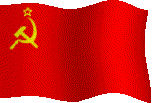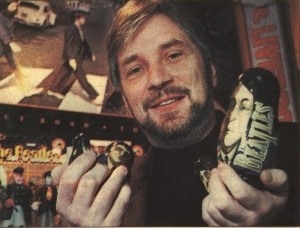 |
|
|
"Flew in from Miami Beach BOAC
Didn't get to bed last night
On the way the paper bag was on my
knee
Man I had a dreadful flight
I'm back in the U.S.S.R.
You
don't know how lucky you are boy
Back in the U.S.S.R.
Been away so long I hardly knew the place
Gee it's good to be back
home
Leave it till tomorrow to unpack my case
Honey disconnect the
phone
I'm back in the U.S.S.R.
You don't know how lucky you are boy
Back in the U.S.
Back in the U.S.
Back in the U.S.S.R."
"Back in the U.S.S.R." excerpt of the lyrics composed and written by
John Lennon/Paul McCartney
Copyright by Northern Songs Ltd,
1968 |
INTRODUCTION:
On August 10, 2000, both Tony Copple and I received e-mail notices from ABC
Television in New York requesting contact information about Dr. Yury Pelyushonok
-- a local author whose literary work we feature here at the Ottawa Beatles Web
Site. The request came in from Alex Kay of ABC Television who alerted us in her
e-mail about their production of a Beatles special tentatively titled "How The
Beatles Changed the World" -- which later became known as "The Beatles
Revolution." We forwarded her the appropriate contact information and a as
result Dr. Pelyushonok found himself making an appearance in the show.
Shortly after Dr. Pelyushonok's interview with ABC television, we decided to
alert the Ottawa Citizen about the upcoming Beatle special as a potential story
for their paper. The Ottawa Citizen saw merit in our suggestion and so they
chose free-lance reporter Bruce Deachman to interview Dr. Pelyushonok in his
west-end home. The Ottawa Beatle Site wishes to express grateful acknowledgment
to Bruce Deachman and the Ottawa Citizen for granting us use of their
full-length paper edition report which appeared on Friday, November 17, 2000.
-- John Whelan, Chief Researcher for the Ottawa Beatles Site
He loves them, yeah, yeah, yeah
Ottawa writer looks at Beatles' influence on Soviet culture
Bruce Deachman
The Ottawa Citizen

Photo by Rebecca Stevenson, the Ottawa Citizen. Yury
Pelyushonok, author and collector of Beatles
trinkets.
|
There's an unmistakable and pervasive theme to the basement office of
Yury Pelyushonok's west-end Ottawa home.
Pictures of the Beatles adorn the walls, alongside Soviet LP covers of the
Fab Four. The famous Abbey Road shot hangs above fiveYellow Submarine Beatles
toys, still in their original packaging. A few 45s are on the wall, too, as is a
39-cent Beatles hairbrush. Wooden Russian dolls, bearing likenesses of the
Liverpudlians, rest on the window-sill. There's a Beatles mug, plastic rings and
glow-in-the-dark Yellow Submarine stickers. A number of framed commemorative
postage stamps of the Beatles, from countries like Tanzania and St. Vincent, are
also on display, my favourite being the communist-mocking, two-stamp set issued
by Abkhazia, bearing the images of Groucho Marx and John Lennon.
"You're a bit of a fanatic," I say, stating the obvious.
"No, not really," Pelyushonok answers. "It's not like I listen to their music
250 times a day."
I wonder.
A tall 43-year old man, he bends over to press the 'Play' button on a
cassette-player. "Listen," he says, and the room is filled with the words and
music to The Yeah-Yeah Virus, a song that he and his translator-cum-fiance, Olga
Sansom, wrote, and which is being performed by a neighbour, John Jastremski.
"You may know of him," says Pelyushonok, telling me the name of the Ottawa
band that the singer was, or is, in. Unable to recognize the name, I shake my
head and listen to the song. It is reminiscent of old Paul Simon with a dash of
the Monkees thrown in.
"I was thinking of Can't Buy Me Love when I wrote it," he says.
While in the West the Beatles stepped on all the rules
The '60s beat
was echoing through all the Soviet schools.
Every Russian schoolboy wants to
be a star
Playing Beatles music, making a guitar.
Teachers looked upon
all this as if it were a sin,
We were building Communism but the Beatles
butted in.
'Nyet!' to Beatles music. 'Da!' the students said.
Even Comrade
Brezhnev sadly shook his head...
The song's lyrics pretty accurately sum up Pelyushonok's experiences growing
up in the '60s and '70s in the Soviet Union, where access to Western culture was
spare, and misinformation rampant.
"Being a Beatles fan in North America was easy," he says. "Not so in Russia.
In those days, he explains, it was illegal to bring a Beatles record into the
country and if you were found with one, it was usually confiscated. As a member
of the Soviet national fencing team, he witnessed the same airport routine time
and again: "If, say, a famous sportsman came back from a foreign country, the
customs authorities would ask, 'Do you have a Beatles' record?"
"And if you did, they would put the record on this special device, scratch
it, and then return it to you as a souvenir."
Recordings that did manage to pass through the tight screen were as good as
gold, he says. "Some diplomats, some famous, famous athletes, and some sailors
managed to smuggle in illicit records," he says. "Immediately, the whole country
would have copies of these on reel-to-reel tape."
Most of the Beatles music that Pelyushonok managed to listen to was, at best,
third- or fourth-generation copies.
"'Beatlyi' was the Russian word to describe things by the Beatles,"
Pelyushonok adds. "I remember hearing that word for the first time in 1964, when
I was in Grade 1. Even then, I knew exactly what it meant.
"I don't know how it got around. It wasn't in the newspaper, it wasn't
anywhere. But it's like corruption; you just sense it."
Pelyushonok has recently published a book chronicling his experiences,
titled, Strings For A Beatle Bass: The Beatles Generation in the USSR. The book
explains the Soviet opinion of the Beatles and the importance and prevalence of
the Fab Four in Russian cultural history.
According to Pelyushonok, it began as a small article, written when he
attended the 1995 Ottawa Beatles Convention at the National Museum of Science
and Technology. (He had emigrated to Canada in 1993, because of political
conditions in Russia. "I couldn't stay any longer.")
Pelyushonok, a doctor in the Soviet Union whose training isn't recognized as
a doctor in Canada, got a job at Wal-Mart. At night, he began writing down his
stories of growing up and the connection to the Beatles.
"The youth of the Soviet Union do not need this cacophonous rubbish," stated
Soviet leader Nikita Krushchev of the Beatles in the early 1960s. "It's just a
small step from saxophones to switchblades."
Yet the Soviet youth, claims Pelyushonok, did need the Beatles, and went to
enormous lengths to be more like them. Pelyushonok contends that the Beatles,
and not other bands of the time, were the single-most major factor in shaping
pop culture behind the Iron Curtain.
"They were considered the big capitalist threat during the Cold War," he
says.
"You could bring Rolling Stones albums into the country, later on, but not
the Beatles.
"You know why? I think it's because the Beatles were an event. The Rolling
Stones were a rock band, but the Beatles were the cultural event of our century.
"One-hundred out of 100 kids, if asked who invented the electrical guitar,"
he continues, "would answer 'The Beatles.' Who invented rock-and-roll? The
Beatles.
"Every event has a master, and the master of modern music was the Beatles."
In his book, Pelyushonok describes the lengths that he and others went to in
order to build a guitar. For example, since only traditional seven-string
acoustic folk guitars were readily available then, and bass guitars were unheard
of, he built his own bass guitar, only to discover that bass strings were
impossible to get. The solution was to steal some from a school piano, an act
that didn't go unnoticed at the next school assembly, nor one that went
unpunished. At the New Year's Eve concert that his newly-formed "beat-band"
played at, retribution was final, as the piano strings snapped his guitar in
half.
It seemed everyone was in a band then, says Pelyushonok, and they all played
Beatles' songs, whether they knew the words or not. Curiously, however, they
never performed Beatles' songs in public.
In the U.S.S.R., the Beatles were surrounded by such an aura of legend and
fame," he writes in his book, "that no one dared to even approach them. The word
Beatles was almost sacred, just like the cow in India. To go out onto the stage
and imitate John Lennon would have been...like a faithful Catholic dressing up
as Jesus Christ for Halloween."
Rolling through the '60s, '70s, '80s and '90s, the book includes the death of
John Lennon, by which time the Soviet propaganda machine has turned 180 degrees,
contending that the American secret service had assassinated Lennon, a proponent
of peace and a friend of the Soviet Union's.
Recently, the book came to the attention of executives at ABC, whose Beatles
documentary, The Beatles Revolution, airs tonight at 8:00 p.m.
Pelyushonok was flown to New York last month, where he was interviewed for
hours for the show.
"It was us, listening to the Beatles," he says, "that became Russia's lost
generation.
"And we grew up and became the deputies, and we became the officers, and
that's what changed the country.
"The Beatles brought this message about love and peace," he adds, "but there
was this thundering silence and fury. (The authorities) wouldn't listen. They
wouldn't pay attention. "But you know what the Beatles did? They allowed us a
little bit of a way to escape when there was no escape."
Pelyushonok bends over once more to play the tape. The lyrics again tell his
story:
Each Comrade's child was in a band,
The yeah-yeah virus swept the
land,
What could they do? What could they say?
A generation gone astray.
The yeah-yeah had them in its sway.
What could they do, what could they
say? They walked away..."
Copyright by the Ottawa Citizen, November 17, 2000.
Used with
permission.
Flag of Russia courtesy of Multimedia Palace
Ottawa Beatles
Site
